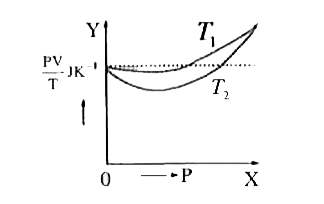A gas is allowed to expand isothermally.The root mean square velocity of the moleculesSolution in Telugu
Will increase
Will decrease
Will remain unchanged
Depends on the other factors
The correct Answer is:C
Step by step video, text & image solution for A gas is allowed to expand isothermally.The root mean square velocity of the molecules by Physics experts to help you in doubts & scoring excellent marks in Class 11 exams.
Updated on:21/07/2023Topper's Solved these Questions
- KINETIC THEORY OF GASESBook:AAKASH SERIESChapter:KINETIC THEORY OF GASESExercise:Exercise -II
Explore 32 Videos
- KINETIC THEORY OF GASESBook:AAKASH SERIESChapter:KINETIC THEORY OF GASESExercise:Practice Exercise
Explore 15 Videos
- KINETIC THEORY OF GASESBook:AAKASH SERIESChapter:KINETIC THEORY OF GASESExercise:Problems
Explore 12 Videos
- KINEMATICSBook:AAKASH SERIESChapter:KINEMATICSExercise:ADDITIONAL PRACTICE EXERCISE (PRACTICE SHEET (ADVANCED)) (Integer Type Questions)
Explore 12 Videos
- LAWS OF MOTIONBook:AAKASH SERIESChapter:LAWS OF MOTIONExercise:PRACTICE EXERCISE
Explore 108 Videos
Similar Questions
cylinder of capacity 20 litres is filled with H2 gas. The total average kinetic energy of translatory motion of its molecules is 1.5×105 J. The pressure of hydrogen in the cylinder is
View SolutionThe kinetic energy of translation of 20gm of oxygen at 47∘C is (molecular wt. of oxygen is 32gm/mol and R=8.3 J/mol/K)
View SolutionFigure shows plot of PVT and P for 2gm of oxygen gas at two different temperatures

(i) The significance of dotted line
(ii) The relation between T1andT2
(iii) The value of PVT where the curves meet on the x-axis.
View SolutionThree particles start from origin at the same time: one with velocity v1 along positive x - axis, the second along the positive y-axis with a velocity v2 and the third along the line y=x with such a speed that all the three always stay in a straight line, then the velocity of the third particle is √kV1V2(V1+V2).
View SolutionA force of 50 N acts on a body of mass 10 kg at rest. Its velocity after 5 seconds if the same force acts, is
View SolutionRoot Mean Square velocity of molecules of a gas varies……………..as the …………….of absolute temp. of the gas.
View SolutionRoot mean square velocity of a gas molecule is proprotional to
View SolutionAn ideal gas (lmanda=1.5) is expanded adiabatically. How many times has the gas to be expanded to reduce the root mean square velocity of molecules 2.0 times
View SolutionA ideal gas (gamma=1.5) is expanded adiabatically. How many times has the gas to be expanded to reduce the root mean square velocity of molecules 2.0 times
View SolutionThe root mean square velocity of a gas molecule at any temperature T K of a gas molecule of molecular weight M is
View SolutionRoot mean square velocity of a gas molecule is proprotional to
View SolutionWhat is the ratio of average velocity and root mean square velocity of the molecules of a gas?
View Solutionगैस के अणुओं का औसत वेग 400 मी /से है। समान ताप पर गैस के अणुओं के वर्ग - माध्य मूल वेग (rms velocity) की गणना कीजिए।
View Solutionगैस अणु का वर्ग माध्य मूल वेग निम्नलिखित में से किसके समानुपाती होता है?
View Solutionयदि किसी पात्र में अणुओं का वर्ग माध्य मूल वेग दुगुना कर दिया जाये तो पात्र में गैस का दाब
View SolutionA gas is allowed to expand isothermally.The root mean square velocity of the molecules
View Solution

